The best subscription ecommerce platform gives today’s business owners an exceptional way to increase the lifetime value of their customers, and unlock recurring revenue.
With a subscription platform, companies can sell everything from packages of crucial products delivered on a monthly basis, to webinar and online course access.
Subscription platforms allow companies to spend less time worrying about finding new customers, by providing them with a convenient way to retain existing clients. The challenge is in finding a solution suitable for your business model.
Today, we’re going to be reviewing some of the top subscription ecommerce platforms available to business owners in 2023.
What is Subscription Ecommerce?
Subscription ecommerce is the term given to an online business model in which consumers sign up for long-term access to a product or service.
Rather than just purchasing an item as and when they need it, consumers agree to pay a monthly or annual fee for a specific solution.
Subscriptions can either have a specific end date, or continue until a customer cancels their membership.
For a business, subscription ecommerce offers an amazing way to increase the lifetime value of each customer. For consumers, subscription services offer simplicity and convenience.
By 2026, the market for subscription ecommerce is expected to reach a value of approximately $900 billion.
What to Look for in a Subscription Ecommerce Platform
A subscription ecommerce platform is a special kind of software tool, designed to help companies build their subscription websites, and sell memberships to customers.
These tools come in a variety of formats, from omnichannel ecommerce platforms to tools specifically suited to selling specific things, like courses, webinars, and digital content.
The ideal features of your subscription platform will vary, but some of the most important things to look for when making your choice include:
- Payment methods: Your platform should allow you to take various kinds of payments, from credit cards, digital wallets, and solutions such as PayPal and Stripe.
- Analytics and reporting: Reporting and analytical features will help you track the success of your subscriptions, monitor your most valuable customers, and unlock growth opportunities.
- Ease of use: A good subscription ecommerce platform should be user-friendly for both the company and the consumer. Look for something streamlined and intuitive.
- Recurring billing: Your platform should be able to set automated invoices and bills to customers on a regular basis, making it easier to manage your cashflow.
- Integrations: Subscription ecommerce platforms may need to integrate with a range of tools, from accounting software to customer relationship management platforms.
- Customer support: A good ecommerce platform will always come with access to support and assistance when you’re dealing with technical issues and other problems.
The Best Subscription Ecommerce Platforms in 2024
There are numerous ecommerce platforms available on the web today for business owners looking to manage and sell their own subscriptions.
We chose the top options below based on the factors outlined above. We also looked at each platform’s reputation, functionality, and pricing.
1. Shopify

Shopify is a versatile ecommerce platform and website builder, suitable for all kinds of business models. It supports companies in selling digital and physical products, offers apps for dropshipping and print on demand, and even allows companies to set up recurring bills and invoices.
Shopify comes with a variety of responsive themes to choose from, as well as a customizable checkout, inventory management tools, and even analytics and reports for tracking business success.
As well as a built-in subscription option, Shopify also allows companies to enable subscription billing through the use of third-party apps and add-ons on the Shopify app store.
Shopify prices start at $29 per month for basic ecommerce functionality. However, some subscription apps and add-ons will have additional fees.
Pros 👍
- Easy to manage subscriptions in a back-end environment
- Wide range of themes and templates for ecommerce stores
- Integrations with a host of apps and add-ons for subscriptions
- Secure system for managing customer payments
- Reporting and analytics included
Cons 👎
- Transaction fees for those not using Shopify payments
- Some add-ons can have additional fees
Further reading 📚
2. Wix

Convenient and straightforward, Wix is a flexible ecommerce platform suited to a wide variety of businesses.
The platform comes with everything you need to set up, manage, and host your online store, including professional templates, inventory management, and a range of payment processing options. There’s also a built-in tool for selling product subscriptions.
The subscription service offered by Wix allows you to automatically bill customers for products on a monthly, bi-monthly, or any other basis.
You can create custom expiration times for subscriptions, and allow subscriptions to automatically renew. There’s also the option to offer subscriptions and one-off purchases for the same product or service.
Prices for Wix start at $23 if you want to access the ecommerce and subscription services. There are some transaction fees to consider too.
Pros 👍
- Easy to use website builder with included AI
- Secure payment options for customers
- Wide range of subscription settings and choices
- Lots of discount and voucher code options
- Plugins and integrations with existing tools
Cons 👎
- Exporting customer data can be difficult
- Subscriptions for digital products can be trickier to create
Further reading 📚
3. Squarespace
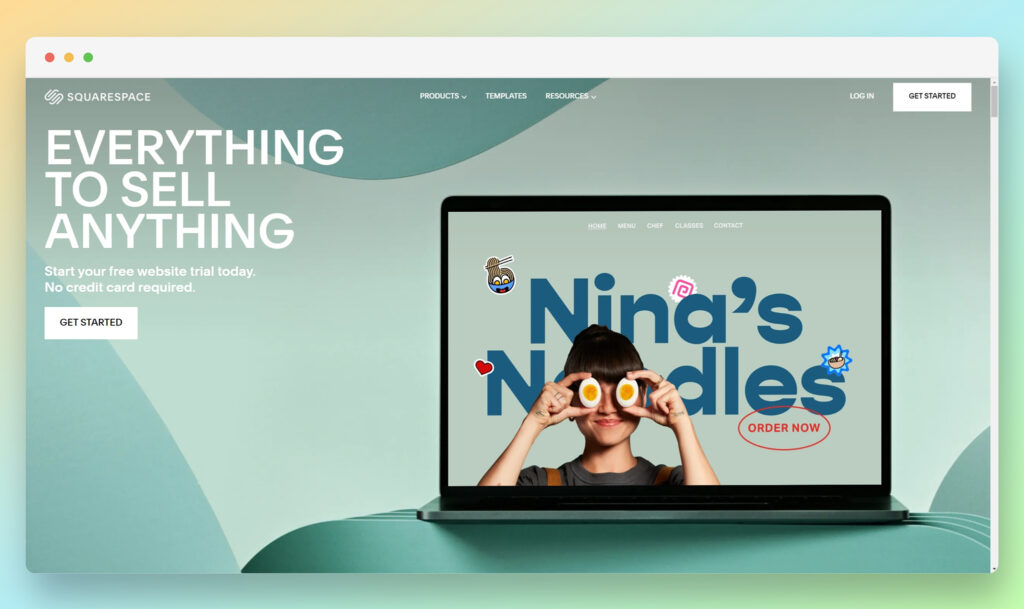
Championed around the world for its stunning professional themes and templates, Squarespace is a hosted ecommerce platform which allows businesses to sell physical and digital products anywhere.
The easy-to-use environment comes with built-in website analytics, to help manage your transactions, and advanced shipping and fulfilment tools.
With Squarespace, there are no fees to pay on your transactions, and it’s easy to set up special offers and discounts for customers leveraging your subscription service.
Squarespace even comes with tools to help you stand out online, such as a built-in blog and integrations with social media platforms.
Squarespace has a range of pricing options to choose from, but if you want to set up and manage your own subscriptions, you’ll need to invest in at least the Commerce plan, starting at $26 per month if you pay for your service annually.
Pros 👍
- Professional, responsive, and attractive website templates
- Tools for social media marketing and content
- Features for building landing pages
- Free custom domain name on most plans
- Advanced analytics and shipping options
Cons 👎
- Limited scalability for bigger brands
- Subscription options aren’t available on all plans
Further reading 📚
4. Square Online
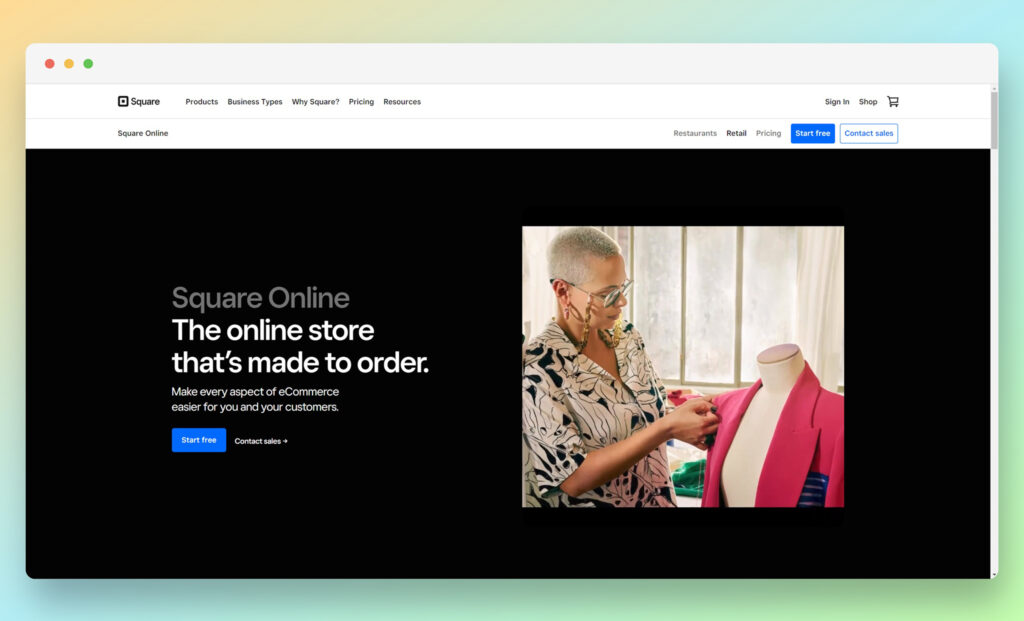
While most people know Square as a payment processing company, the brand also has its own website building platform.
This solution is ideal for businesses looking to unify their physical brick-and-mortar store with an online presence. Square’s solution comes with a built-in online checkout, which allows users to accept payments from a range of different platforms.
You can use Square Invoices to set up recurring bills for customers, or leverage the built-in subscription checkout solution to accept weekly, monthly, quarterly, or annual payments.
Square also offers companies access to analytical tools for tracking purchases, inventory management solutions, and marketing integrations for online growth.
It’s possible to start building your Square online store for free, and you’ll only pay the standard ecommerce processing fee for each transaction.
Pros 👍
- Ideal for syncing digital and physical stores
- Free platform for beginners to use
- Easy-to-use environment with plenty of guidance
- Fantastic range of promotional tools
- Low processing fees on transactions
Cons 👎
- Subscription settings can be a little tricky to set up
- Limited functionality for growing online businesses
5. Podia
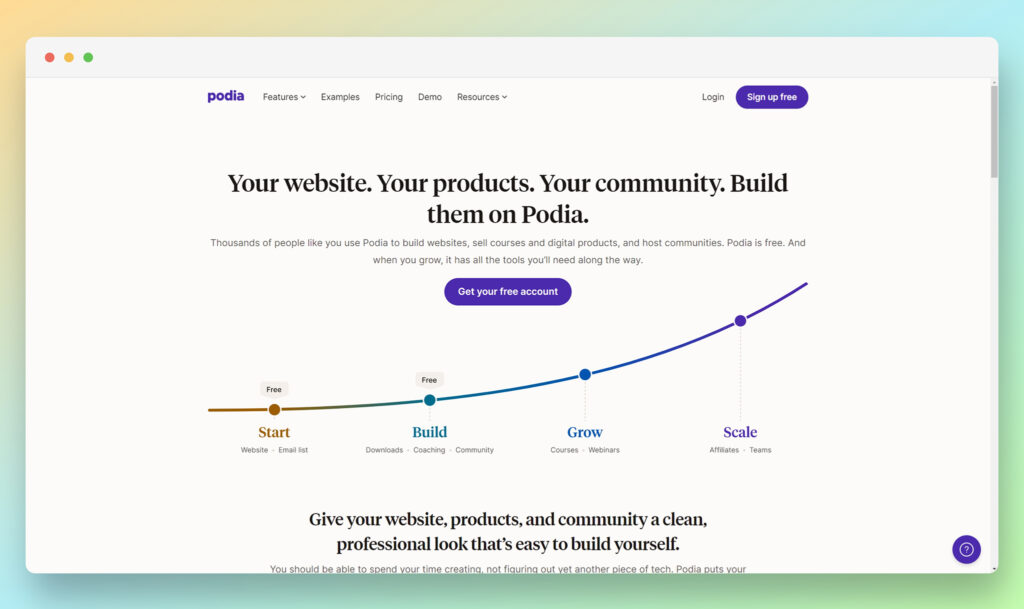
If you’re looking to sell digital products such as courses, memberships to online communities, and access to webinars, Podia might be the ideal solution.
The online membership platform allows you to create a custom website where you can sell all kinds of content, according to your own pricing requirements. You can also access unlimited memberships on any plan.
The Podia ecosystem is easy to use, with everything you need to launch your business, including a website builder, email marketing tools, secure payment processing, and hosting for your digital products. You can also link your site to tools like Facebook and Slack.
Pricing for Podia starts with a free plan which allows you to create a full website and 1 community, but you can only sell one product. For unlimited subscription sales, you’ll need the Mover plan, starting at $33 per month.
Pros 👍
- Support for hosting and selling digital products
- Excellent range of community and membership tools
- CMS and CRM system included
- Plenty of customization options for business leaders
- Support for multiple payment methods
Cons 👎
- Limitations on the free plan
- Affiliate marketing is only available on the most expensive plan
6. Recurly
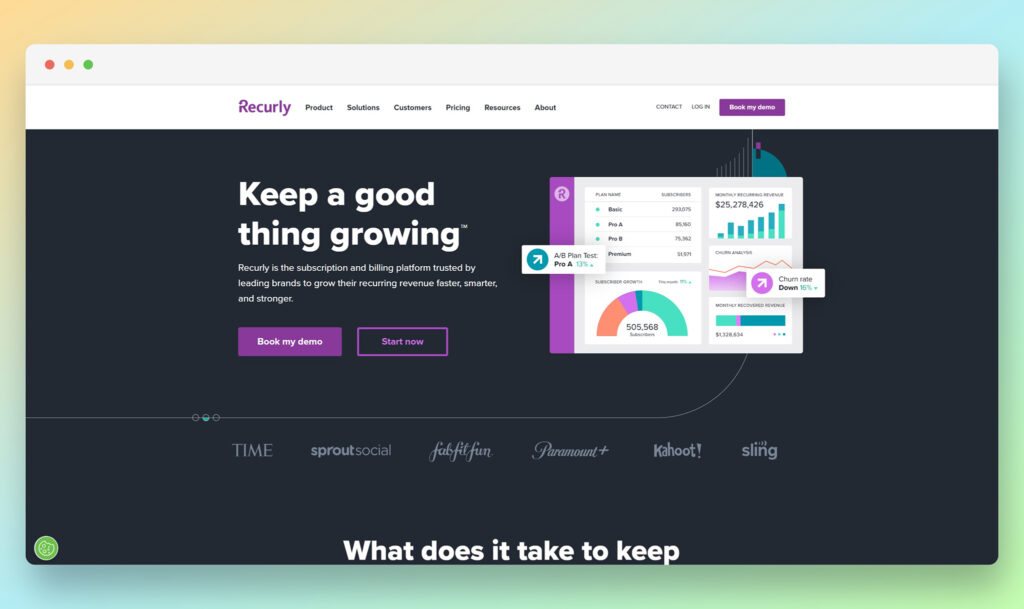
Ready to integrate with a host of existing website builders, Recurly is an all-in-one subscription management and selling platform.
Designed to help companies launch their own subscription business quickly, the solution supports multiple payment gateways, and allows companies to request recurring payments for both physical and digital products.
The easy-to-use platform comes with subscriber management tools, so small businesses can strengthen their relationship with customers.
There are built in analytics and reporting capabilities for retailers, and even solutions for churn management. Recurly allows you to sell a host of downloads and tools through any site, even if you’re not using an ecommerce website builder.
Users can access the core features of the platform for free, and leverage advanced features like subscriber wallets and manual invoicing on plans with custom pricing.
Pros 👍
- Options to get started with no monthly fee
- Suitable for selling subscription box and digital download products
- Management tools for automatic payments
- Analytics for increasing upsells and cross sells
- Flexible support for different payment processors
Cons 👎
- No ecommerce site builder included
- Some features are missing from the free plan
7. Sellfy
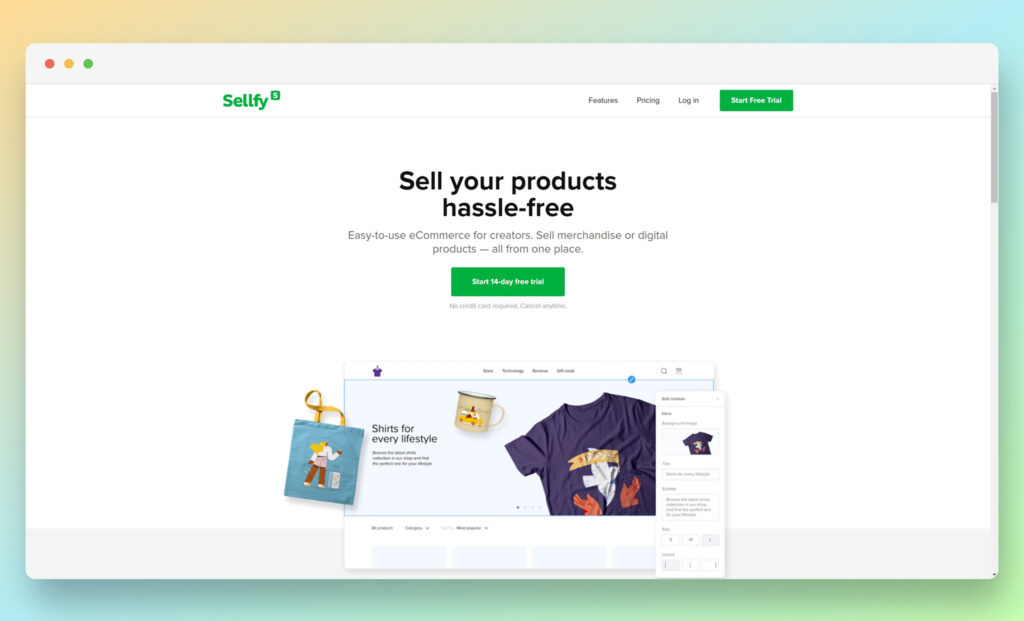
Sellfy is a straightforward tool designed to help creators and business leaders sell products across a range of platforms. You can launch your store with no coding knowledge, and there are no transaction fees to worry about beyond standard payment processing costs.
Sellfy allows users to set up custom billing schedules and automated invoices for their subscription customers, and accept payments using credit cards, PayPal, Stripe, and other platforms.
All transactions are secured to the highest standards, and customers can even manage their own accounts with membership profiles on your website.
All of the Sellfy plans include access to subscription selling, including the $19 Starter plan. However, you will only be able to process $10k in sales with this package per year.
Pros 👍
- Unlimited digital and physical products on all plans
- Convenient custom subscriptions and billing schedules
- Support for multiple payment methods
- High levels of security and encryption
- Email marketing and social media tools
Cons 👎
- Limitations on how much you can sell with each plan
- The cheapest plan includes Sellfy branding
Choosing your Subscription Ecommerce Solution
As the subscription model grows increasingly popular, there are now numerous tools companies can use to design their own subscription strategy.
Whether you’re looking for an all-in-one tool to develop your ecommerce business, like Shopify, or you want to access a plugin or open-source add-on for your existing website, you’re sure to find a solution that fits your goals.
Today, selling subscription products has never been easier. Just remember, to ensure your subscription-based business continues to grow, you will need to invest in constantly earning more renewals through amazing customer service and retention.




Comments 0 Responses